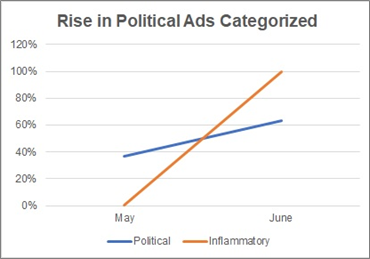
Key Insights
- Inflammatory ads are expected to grow exponentially up through the U.S. elections
- Recommendations
- Document a policy that addresses treatment of political and inflammatory content
- Communicate the policy with partners and monitor acknowledgment of it
- Add policy compliance to your partner evaluation rubric or scoring guide
In response to the current uneasy environment, publishers and their adtech partners are paying close attention to what traverses their digital supply chains and modifying their advertising policies accordingly. The pandemic, state of the global economy, social justice movements, and U.S. elections have forced industry players into a difficult position: balancing freedom of expression and revenue with allegations of inciting violence or spreading misinformation.
Increasing need to isolate inflammatory from political content
The intersection of political and inflammatory ads is an emerging interest for digital advertising industry players. A World Federation of Advertisers (WFA) report indicates that more than 70% of marketers (representing $92B in spend) are concerned about the industry’s failure to police hate speech.
While inflammatory ads represent less than 1% of The Media Trust’s categorized ads today, the number is growing exponentially when viewed as a subset of political ads, from May through June. [Figure 1]

This is important as these ads are likely to have a broader reach than typical campaigns due to their larger budgets and the consumer interest associated with this election year’s opposing party messages. The impact of these ads is amplified as they are dissected on numerous social channels—cheered by some, vilified by others.
Political ad spend will increasingly become a stressful issue for publishers and their partners. Cushioning the pandemic-driven downward spiral, political digital ad spend is expected to best $1B this year in the U.S. and gather momentum throughout the year, with 67% of spend occurring between September and November.
Ad quality is becoming a C-suite issue
Concerns about fostering social injustice or propagating political turmoil are very real. [Figure 2] However, it’s a very subjective quandary. In the absence of clear or easy-to-enforce regulations governing the digital supply chain, publishers and their partners have elevated the discussion to the executive level where discussions increasingly center around maintaining brand integrity, not revenue. These teams review ads categorized as either political or potentially inflammatory and act according to their company policy.

Strategies to avoid complaints
Industry players have adopted a range of strategies to avoid brand-damaging accusations. From limiting spend on platforms that don’t control content to banning all political ads, publishers and adtech partners are developing and enforcing policies to identify and categorize political ads, especially those with inflammatory content. These policies are shared with partners, and executive teams are interested in knowing which partners are repeat offenders.
Balancing pandemic-driven economic losses with upcoming political advertising revenue opportunities will be no easy task for adtech and media firms. One thing is clear, for those running political ads in the coming months it will be critically important to take a well-reasoned approach and avoid inflammatory ads.



